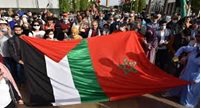By Ahmed A. Yusuf
In what many are calling a modern-day echo of the Nakba, Israel is reportedly considering a plan to resettle thousands of Palestinians from Gaza to far-off lands, including Morocco. The proposal, which has shocked many across the Arab world, is raising difficult questions about the future of Gaza’s people and the motivations behind Israel’s strategy.
For Palestinians, the plan is nothing short of a continuation of a decades-long campaign to erase their presence from their ancestral land. For Moroccans, the idea of hosting displaced Gazans has sparked a complex debate—balancing their historic solidarity with the Palestinian cause and the risks of becoming complicit in what some are calling a forced deportation.
The Proposal: A Second Nakba in the Making?
The details of Israel’s proposed resettlement plan remain murky, but the intent is clear: remove Gazans from Gaza permanently and scatter them far away from their homeland. Israeli officials have framed the idea as a humanitarian initiative, offering Palestinians a fresh start in more stable regions. But few are convinced by this narrative.
“This is not about helping Palestinians,” said a political analyst based in Amman. “It’s about clearing Gaza. Israel wants the land without its people.”
For Palestinians, the fear of forced relocation is deeply rooted in their history. In 1948, hundreds of thousands of Palestinians were forced to flee their homes during the Nakba (Arabic for “catastrophe”), becoming refugees in neighboring countries. Many of those displaced families remain stateless to this day, living in overcrowded refugee camps across Lebanon, Jordan, and Syria.
Now, it seems history is threatening to repeat itself.
Morocco’s Reaction: The People Push Back
In Morocco, a country with deep ties to the Palestinian cause, news of the proposed resettlement has not gone down well. While the Moroccan government has yet to issue an official response, the public reaction has been swift and intense.
Moroccans have long stood in solidarity with Palestine. From protests in the streets of Rabat to political campaigns supporting Palestinian rights, the country has positioned itself as a strong advocate for the Palestinian struggle. But the idea of accepting displaced Gazans is seen by many as a dangerous step too far.
“We support Palestine’s right to exist—not to be erased,” said Asma, a lawyer and activist in Casablanca. “Bringing Gazans here doesn’t solve the problem; it just helps Israel wipe Palestine off the map.”
On social media, Moroccans have expressed their anger, using hashtags like #NoToResettlement and #PalestineWillNotFall to voice their opposition. For many, accepting this plan would be a betrayal of Palestine’s long struggle for independence.
Diplomatic Minefield
For Morocco’s leaders, the situation is politically delicate. As the Chair of the Al-Quds Committee, King Mohammed VI has long positioned Morocco as a staunch defender of Palestinian rights and Jerusalem’s sacred sites. Any suggestion that Morocco might become part of a forced relocation plan would severely damage this carefully crafted image.
Internally, the political risks are enormous. Leftist and Islamist groups—two of the most vocal forces in Moroccan politics—would mobilize against any resettlement plan, framing it as a national betrayal. Meanwhile, regional rival Algeria would be quick to seize the opportunity to criticize Morocco’s close ties with Israel, further fueling existing tensions between the two countries.
“Accepting this plan would isolate Morocco diplomatically,” warned one political observer. “It would be seen as collaborating with Israel’s long-term goal of erasing Palestine, which is a red line for much of the Arab world.”
A Dangerous Precedent
The stakes are higher than just Gaza or Morocco. If Israel succeeds in permanently displacing Gazans, it sets a dangerous precedent for the entire region. What’s to stop similar plans for the West Bank or East Jerusalem? Could the international community normalize forced relocation as a “solution” to the Palestinian issue?
“This is a test balloon,” said a regional expert. “If the world accepts the idea of Gazans being resettled, it’s only a matter of time before other Palestinian communities face the same fate.”
The fear is real, and it’s shared by many in Gaza, where residents are determined to remain despite years of hardship and suffering. “This is our home,” said Ahmed, a teacher in Gaza City. “They bomb it, blockade it, starve us—but we won’t leave. We’re not going anywhere.”
Gaza’s Future: A Fight for Survival
For now, the plan to resettle Gazans in Morocco remains just an idea. But it has already sparked a fierce debate about the future of Palestine and the role of Arab nations in protecting it. Will Morocco and others stand firm against what many are calling a new Nakba? Or will geopolitical pressures force them to accept the unacceptable?
In the streets of Rabat and Casablanca, the answer seems clear. Protesters carry banners that read “Gaza Belongs to Its People” and “No to Forced Displacement”, chanting in unison: “Palestine is not for sale.”
As one protester put it: “Gaza is not just a place—it’s a symbol of resistance. If we let it fall, we all fall.”
Ahmed A. Yusuf
Email: aayuusuf44@gmail.com


Leave a Reply